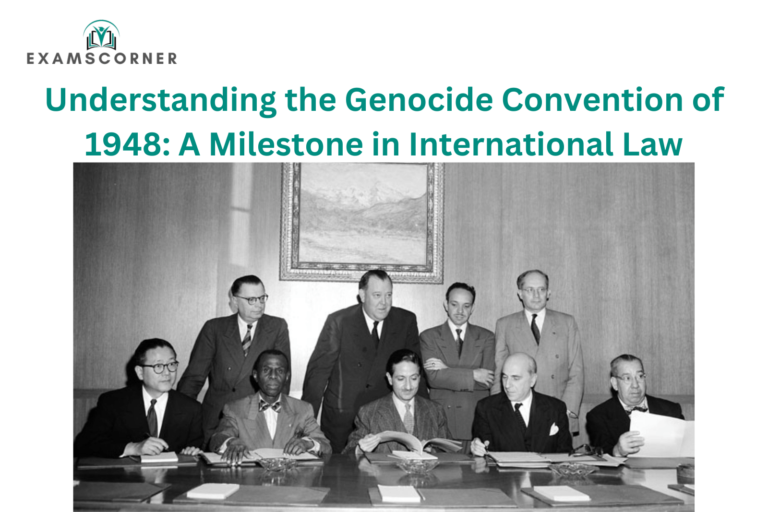Introduction
The Genocide Convention of 1948, officially known as the Convention on the Prevention and Punishment of the Crime of Genocide, is one of the most critical international treaties in modern history. Adopted by the United Nations General Assembly on December 9, 1948, it came into force on January 12, 1951, and marked a decisive step in humanity’s collective effort to prevent and punish the heinous crime of genocide. This article explores the key aspects of the Genocide Convention, its implications, and its enduring relevance.
What is Genocide?
The Genocide Convention defines genocide as acts committed with the intent to destroy, in whole or in part, a national, ethnical, racial, or religious group.
Origins of the Convention
The term “genocide” was coined by Polish-Jewish lawyer Raphaël Lemkin in 1944. He combined the Greek word genos (race or tribe) with the Latin suffix -cide (killing) to describe the atrocities committed by the Nazis during the Holocaust. Lemkin’s relentless advocacy led to the drafting and adoption of the Genocide Convention, which aimed to prevent such crimes in the future.
Key Provisions of the Genocide Convention
- Obligation to Prevent and Punish: The Convention obliges its signatories to take measures to prevent genocide and prosecute those responsible, whether they are individuals, groups, or state actors.
- Universal Jurisdiction: The Convention allows for the prosecution of perpetrators regardless of where the crime was committed, emphasizing that genocide is a crime of universal concern.
- State Responsibility: States can be held accountable for acts of genocide committed by their officials or agents. This provision underscores the importance of state-level accountability.
- Punishment of Individuals: The Convention emphasizes individual criminal responsibility, enabling the prosecution of leaders, policymakers, and perpetrators in international courts or domestic judicial systems.
- International Cooperation: States are required to cooperate with international tribunals and courts, such as the International Criminal Court (ICC), in the investigation and prosecution of genocide cases.
Significance and Impact
The Genocide Convention was the first human rights treaty adopted by the United Nations, setting a precedent for subsequent international legal frameworks. Its adoption highlighted the global community’s recognition of the need to combat crimes against humanity and ensure justice for victims.
The Convention has been invoked in several landmark cases:
- Rwanda (1994): The International Criminal Tribunal for Rwanda (ICTR) prosecuted individuals responsible for the genocide of nearly one million Tutsi and moderate Hutu.
- Bosnia (1995): The International Court of Justice (ICJ) recognized the Srebrenica massacre as genocide, holding Serbia responsible for failing to prevent it.
- Darfur (2003-2005): The ICC issued arrest warrants for Sudanese officials for acts of genocide committed during the Darfur conflict.
Challenges in Implementation
Despite its importance, the Genocide Convention faces several challenges:
- Political Will: States often hesitate to label atrocities as genocide due to political and diplomatic considerations.
- Delayed Responses: International responses to genocide are frequently slow, allowing atrocities to escalate.
- Lack of Enforcement: The Convention’s enforcement relies heavily on international cooperation, which is not always forthcoming.
- Evolving Nature of Genocide: Modern genocides often involve complex dynamics, such as non-state actors, making it harder to identify and address them.
Relevance Today
The Genocide Convention remains as relevant as ever. Contemporary crises, including those in Myanmar (Rohingya), Darfur, and Gaza, underscore the need for vigilant enforcement and proactive measures. The rise of hate speech, xenophobia, and targeted violence worldwide serves as a stark reminder that the international community must remain committed to the principles of the Convention.
Conclusion
The Genocide Convention of 1948 stands as a beacon of hope and accountability in the fight against mass atrocities. While challenges persist, its principles provide a foundation for justice and prevention. As the world commemorates significant milestones, it is crucial to remember the lessons of history and reaffirm the global commitment to “never again.”



